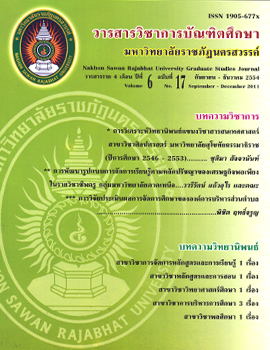การพัฒนาการจัดกิจกรรมการเรียนรู้ เรื่อง สารชีวโมเลกุล กลุ่มสาระการเรียนรู้วิทยาศาสตร์ ชั้นมัธยมศึกษาปีที่ 5 โดยใช้กระบวนการสืบเสาะหาความรู้ 7 ขั้น
Main Article Content
Abstract
บทคัดย่อ
การวิจัยครั้งนี้มีวัตถุประสงค์ดังนี้ 1) เพื่อพัฒนาแผนการจัดกิจกรรมการเรียนรู้แบบสืบเสาะหาความรู้ 7 ขั้น ที่มีประสิทธิภาพตามเกณฑ์ 80/80 2) เพื่อหาดัชนีประสิทธิผลของการจัดกิจกรรมการเรียนรู้แบบสืบเสาะหาความรู้ 7 ขั้น 3) เพื่อเปรียบเทียบผลสัมฤทธิ์ทางการเรียนของนักเรียนที่เรียนโดยใช้กิจกรรมการเรียนรู้แบบสืบเสาะหาความรู้ 7 ขั้น ก่อนและหลังเรียน และ 4) เพื่อเปรียบเทียบเจตคติเชิงวิทยาศาสตร์ ของนักเรียนที่เรียนโดยใช้กิจกรรมการเรียนรู้แบบสืบเสาะหาความรู้ 7 ขั้น ก่อนและหลังเรียน กลุ่มตัวอย่าง ได้แก่ นักเรียนชั้นมัธยมศึกษาปีที่ 5/4 โรงเรียนสตรีชัยภูมิ จำนวน 50 คน ได้จากการสุ่มแบบกลุ่ม เครื่องมือที่ใช้ ประกอบด้วย แผนการจัดกิจกรรมการเรียนรู้ จำนวน 8 แผน แบบทดสอบวัดผลสัมฤทธิ์ทางการเรียน ชนิดเลือกตอบ 4 ตัวเลือก จำนวน 40 ข้อ มีค่าความยากง่ายรายข้อเท่ากับ 0.53 – 0.71 ค่าอำนาจจำแนกรายข้อเท่ากับ 0.22 – 0.76 ค่าความเชื่อมั่นทั้งฉบับ เท่ากับ 0.92 และแบบวัดเจตคติทางวิทยาศาสตร์ ชนิดเลือกตอบ 4 ตัวเลือก จำนวน 40 ข้อ ค่าอำนาจจำแนกรายข้อเท่ากับ 0.35 – 0.82 ค่าความเชื่อมั่นทั้งฉบับ เท่ากับ 0.93 สถิติที่ใช้ในการวิเคราะห์ข้อมูลได้แก่ ร้อยละ ค่าเฉลี่ย ส่วนเบี่ยงเบนมาตรฐาน และการทดสอบที
ผลการวิจัยพบว่า
1. แผนการจัดกิจกรรมการเรียนรู้แบบสืบเสาะหาความรู้ 7 ขั้น กลุ่มสาระการเรียนรู้วิทยาศาสตร์ เรื่อง สารชีวโมเลกุล ชั้นมัธยมศึกษาปีที่ 5 มีประสิทธิภาพ 84.48/86.20
2. ดัชนีประสิทธิผลของแผนการจัดกิจกรรมการเรียนรู้แบบสืบเสาะหาความรู้ 7 ขั้น กลุ่มสาระการเรียนรู้วิทยาศาสตร์ เรื่องสารชีวโมเลกุล ชั้นมัธยมศึกษาปีที่ 5 มีค่าเท่ากับ 0.8165 คิดเป็นร้อยละ 81.65
3. ผลสัมฤทธิ์ทางการเรียนหลังเรียน โดยใช้การจัดกิจกรรมการเรียนรู้แบบสืบเสาะหาความรู้ 7 ขั้น เรื่องสารชีวโมเลกุล กลุ่มสาระการเรียนรู้วิทยาศาสตร์ ของนักเรียนชั้นมัธยมศึกษาปีที่ 5 สูงกว่าก่อนเรียนอย่างมีนัยสำคัญทางสถิติที่ระดับ .01
4. นักเรียนมีเจตคติทางวิทยาศาสตร์หลังเรียน โดยใช้การจัดกิจกรรมการเรียนรู้แบบสืบเสาะหาความรู้ 7 ขั้น เรื่องสารชีวโมเลกุล กลุ่มสาระการเรียนรู้วิทยาศาสตร์ โดยรวมและรายด้าน 8 ด้าน สูงกว่าก่อนเรียน อย่างมีนัยสำคัญทางสถิติ ที่ระดับ .01
Abstract
The purposes of this research were 1) to develop classroom learning activity that focused on Scientific Inquiry Method (7E) which has 80/80 effective result, 2) to figure out the effectiveness of learning activity by Scientific Inquiry Method (7E), 3) to compare learners’ learning effectiveness by using Scientific Inquiry Method (7E) with pre-test and post-test, and 4) to compare the learners’ attitude toward the learning activity by Scientific Inquiry Method (7E). The samples for this research were 50 students of Matayom 5/4 fromSatrichaiyaphumSchoolobtained by Random Sampling Method. The degree of instruments for this research were 8 lesson plans, 40 items academic examination with 4-multiple-choice. The discrimination is 0.22 – 0.76 and the reliability index is 0.92. And for the questionnaire for the learners attitude toward science, it is a 40-item-questionaire with 4 multiple choices. The degree of discrimination is 0.35 – 0.82, the reliability index is 0.93. The statistics used to analyze general information were Mean (), Standard Deviation (S.D.) and t-test Dependent Samples.
The findings were
1. The lesson plan on Biomolecules for Matayom 5 students focusing on Scientific Inquiry Method (7E), Department of Science, has 84.48/86.20 effectiveness.
2. The effectiveness index of the lesson plan on Biomolecules for Matayom 5 students, focusing on Scientific Inquiry Method (7E), is 0.8165 and its percentage is 81.65.
3. The students’ learning achievement, after they were taught by the learning activity on Biomolecules for Matayom 5 students focusing on Scientific Inquiry Method (7E), was significant by better at the level of 0.01.
4. The learners has got a better attitude toward learning science after they were taught by the learning activity on Biomolecules for Matayom 5 students focusing on Scientific Inquiry Method (7E).


